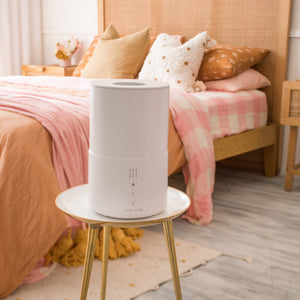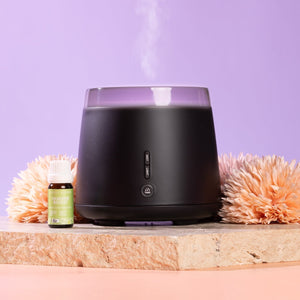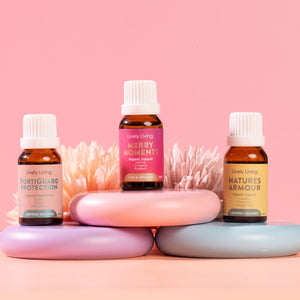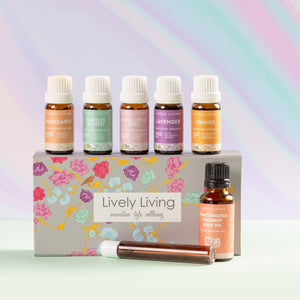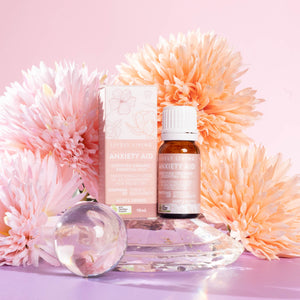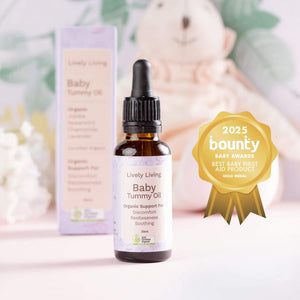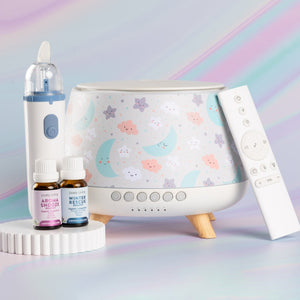DIY Delight: Your Essential Oil Homemade Bug Spray Recipe
Are you always the one at every summer gathering covered in mosquito bites? You're not alone; many people react more intensely to bug bites than others. Perhaps you're also concerned about the ingredients in commercial bug sprays. If you want a safer, effective solution, it’s time to consider a homemade bug spray recipe.
There is nothing worse than using a commercial bug spray with an unpleasant smell, especially if you have kids. Plus, using essential oils has potential mental health benefits and aromatherapy effects. Let's explore how to make your own natural insect repellent with this homemade bug spray recipe.
Table Of Contents:
- Why Choose a Homemade Bug Spray?
- Key Ingredients for Your Homemade Bug Spray Recipe
- Homemade Bug Spray Recipe: The Basics
- Different Homemade Bug Spray Recipe Variations
- Tips for Using Your Homemade Bug Spray Recipe
- Maximizing Effectiveness of Your Homemade Bug Spray
- Frequently Asked Questions About Homemade Bug Spray Recipe
- Conclusion
Why Choose a Homemade Bug Spray?
Many people are now moving toward greener and safer options for bug repellent. I've seen my fair share of insect bites and know they can hurt. Let's look at what to watch out for and how a DIY spray might be the answer, especially if you want something natural.
The Problem with Commercial Bug Sprays
Many conventional bug sprays include ingredients like DEET. While effective, DEET has raised safety concerns. Some studies show that DEET could potentially cause neurological issues, especially in children.
Other common synthetic chemicals can also contaminate the water supply. They also may cause deformities in certain animals. What does that do to us?
Benefits of a Natural Bug Spray
A natural bug spray made at home uses essential oils and other natural ingredients. I know I feel more comfortable using ingredients I understand and trust. Essential oils also have the benefit of smelling amazing.
Not only that, a DIY approach lets you customize your bug repellent to suit your needs. You can also adjust the strength and scent to match your personal preferences.
Key Ingredients for Your Homemade Bug Spray Recipe
If you want a natural spray, let's consider what makes it effective. Knowing your ingredients ensures a safe and successful bug-free summer. Several essential oils have proven repellent properties.
Essential Oils for Insect Repellent
Essential oils are the key to an effective and great smelling natural bug spray. Here's a rundown of some top contenders. Many people use a spray bottle to apply essential oils.
- Citronella: Citronella is one of the most well-known natural insect repellents. Studies show that citronella helps repel mosquitoes, fleas, aphids, and flies. It's commonly used in citronella candles.
- Lavender: I use lavender oil to help with sleep. Some research indicates it's also effective at repelling mosquitoes. Plus, it's usually considered safe for use without dilution.
- Peppermint: Not only is it refreshing, but the EPA recognizes peppermint oil as a natural ingredient with minimal risks. Some research shows that peppermint may repel insects such as mosquitoes, ants, flies, and lice. Another study found peppermint oil may keep spiders away too.
- Lemon Eucalyptus Oil: Oil of lemon eucalyptus (OLE) is a common EPA-approved ingredient used in many insect repellents. Research suggests that OLE may be just as effective for repelling mosquitoes as DEET. The CDC recommends against using “pure” OLE.
- Tea Tree Oil: It has antiseptic qualities and can also deter insects. It may also help with any skin irritations from bug bites.
Other Natural Ingredients to Use
Alongside essential oils, other natural ingredients will help bring your homemade bug spray recipe together. Here are a few you should know.
- Witch Hazel: Witch hazel acts as a carrier and has skin-soothing qualities.
- Distilled Water: It serves as a diluent and creates a lighter solution. It's important to use distilled water.
- Vinegar: Some research indicates that apple cider vinegar may help repel bugs. This ingredient adds extra bug-fighting power; however, more research is needed to fully understand its potential bug-repelling effects.
Homemade Bug Spray Recipe: The Basics
Let’s craft a basic homemade bug spray recipe that you can build on. I always encourage people to test it out and come up with the spray that they like the best for their skin type and sensitivities. If you would prefer a premade bug spray, that's a totally valid choice too. Here’s how to start:
- Glass spray bottle.
- 4 ounces of witch hazel.
- 2 ounces of distilled water.
- 30 drops of essential oils (you can mix and match).
In your glass spray bottle, combine the witch hazel and distilled water. Add in your essential oils, choosing from the list above or your personal favorites. Seal the bottle tightly and shake it.
Shake well before each use, because the oils and water may separate. Using a glass spray is important when making bug spray with natural ingredients.
Different Homemade Bug Spray Recipe Variations
The cool part about DIY? The different choices. Customize your homemade bug spray recipe, based on the ingredients you like, the best scent combos or whatever you happen to have at home. Let's consider several variations for a natural insect repellent.
Herbal Infusion Bug Spray
For an herbal boost to your bug spray recipe, use a combo of dried herbs and witch hazel or vinegar. The results might be less intense than essential oil recipes, but are still effective. Consider these herbs:
- Peppermint.
- Citronella.
- Catnip.
- Lavender.
- Cloves.
In a pot, boil one cup of distilled water, then add a tablespoon each of your chosen herbs and a teaspoon of cloves. Stir, cover, and then kill the heat. Once completely cooled, strain the herbs out.
Mix the remaining liquid with a cup of witch hazel or alcohol. Put it in a glass spray bottle, stored in the fridge for a week.
Vinegar-Based Tick and Insect Repellent
If you have dealt with tick infestations, it is something you definitely do not want to repeat. A powerful apple cider vinegar mix might be just what you need when in tick-infested areas. Here is what I do:
In a quart-size glass jar, put 2 tablespoons each of dried sage, rosemary, lavender oil, thyme, and mint. Next, add 3 to 4 cups of apple cider vinegar. Close it tightly and store it in a cool, dark place for 2 to 3 weeks, shaking every so often.
Strain out the herbs and then store in glass spray bottles in the fridge. When applying, dilute to half with water, because it is so strong.
DIY Essential Oil Blend Recipe
Here is another spray recipe to get the creative juices flowing.
- 2 oz witch hazel
- 2 oz distilled water
- 10 drops lavender essential oil
- 10 drops tea tree oil
- 5 drops peppermint oil
Add everything to the glass spray bottle and shake to combine. Be sure to do a skin patch test and watch out for any sensitivity. Spray on clothing or exposed skin to prevent mosquitoes or insects from coming near.
Using a natural bug spray is a great way to repel mosquitoes and avoid insect bites.
Tips for Using Your Homemade Bug Spray Recipe
Safety comes first before trying a natural mosquito repellent. Take precautions and note some steps to take as you consider homemade insect repellent options.
Safety First
Many natural ingredients can still cause sensitivities. Essential oils need dilution. Citrus oils can cause severe burns and irritation. A carrier oil may be required.
Make sure to test a small area of skin before large scale application. Keep your spray away from eyes and mouth. Use caution when applying to children or pets, watching for any reactions.
Application Best Practices
The time you spray matters. Reapply every few hours, especially after swimming. I find that spraying clothing helps.
Use bug spray inside as well as outside. Avoid scented soaps, lotions, and perfumes. They attract insects, acting like beacons for bug bites.
Maximizing Effectiveness of Your Homemade Bug Spray
Getting the most out of the spray involves more than just mixing the ingredients right. Think strategically to boost your defense. Also think about ways you can help reduce the risk in areas you control.
Combine With Other Preventative Measures
To ramp up protection, I avoid peak mosquito times. Think dusk and dawn. You might use citronella candles. I get rid of all standing water too, since it breeds insects.
Dress strategically, and choose long sleeves. You can also layer up. I like to choose lighter colored clothing so I can easily see anything crawling on me.
Proper Storage to Preserve Your Spray
Exposure to light and air breaks down the spray’s potency. You might use dark glass bottles. This also keeps sunlight from affecting essential oil integrity.
Store your spray in a cool, dry location. Proper storage lengthens its shelf life and preserves effectiveness. The shelf life will depend on what natural ingredients you used so be sure to look up specific estimates.
Frequently Asked Questions About Homemade Bug Spray Recipe
What is the best homemade bug spray?
There isn't a single 'best' homemade bug spray for everyone, as effectiveness can vary depending on the individual, location, and specific pests. Formulas with lemon eucalyptus, lavender, peppermint, or citronella can be quite effective, plus additional supporting elements. Experimenting to see which spray recipe will give you the most effectiveness for you and your family is key.
Will spraying vinegar keep mosquitoes away?
Apple cider vinegar might help with keeping mosquitoes at bay. Research indicates some success, so be sure to mix this in when you create a spray. The level of success depends on your unique environment and personal tolerances.
What is the best home remedy to get rid of bugs?
Getting rid of bugs involves some actions and specific actions that vary by bug. This includes bug sprays to cleaning. Prevention, such as sealing cracks, getting rid of standing water, and making use of insect repellent plants, is another thing to do.
What is the most effective natural bug repellent?
Many find that bug sprays made with oil of lemon eucalyptus (OLE) works best at getting rid of all bugs. These ingredients work wonders: peppermint, garlic, dill, and thyme. Keep in mind what your sensitivities are.
Conclusion
I always prefer making something myself that is effective and better for my family. Crafting your own homemade bug spray recipe lets you steer clear of synthetic chemicals. The bonus? You know every single ingredient you are putting on your body.
Using natural ingredients is a great way to repel mosquitoes. Here's to a safer, happier, and less itchy summer.










